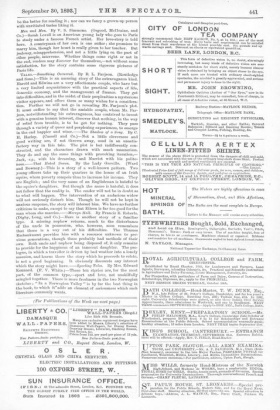TALEs.—Something Occurred. By B. L. Farjeon. (Itoutledge and Sons.)—This is
an amusing story of the extravaganza kind. Harold and Edwina are a very affectionate couple, who have but a very limited acquaintance with the practical aspects of life, domestic economy, and the management of finance. They get into difficulties, and in the midst of their perplexities a mysterious visitor appears, and offers them so many wishes for a considera- tion. Further we will not go in revealing Mr. Farjeon's plot. It must suffice to say that the amiable couple, whom Mr. Far- jeon, notwithstanding his extravagances, has contrived to invest with a genuine human interest, discover that nothing, in the way of relief from trouble, is to be got for nothing. They pass through a variety of queer and perplexing experiences, to emerge in the end happier and wiser.—The Shadow of a Song. By C. H. Harley. (Cassell and Co.)—Not a little cleverness and good writing are, if not thrown away, used in an unsatis- factory way in this tale. The plot is but indifferently con- structed, and the characters drawn with much mannerism. They do and say the same things with provoking iteration,— .Tack, e.g., with his dreaming, and Marriot with his polite- ness.—That Hated Saxon. By the Lady Greville. (Ward and Downey.)—This is a story of a well.known pattern. Two young officers take up their quarters in the house of an Irish squire, whom poverty compels thus to increase his income. They are English ; and the very name of an Englishman is hateful to the squire's daughters. But though the name is hateful, it does not follow that the reality is. The reader will not be in doubt as to what will happen. The intervention of an audacious widow will not seriously disturb him. Though he will not be kept in anxious suspense, the story will interest him. We have no further criticism to make, except to say that Eileen is far too good for the man whom she marries.—Meruplt Hall. By Francis R. Roberts. (Digby, Long, and Co.)—Here is another story of a familiar type. A missing nephew returns, much to the disturbance of the uncle in possession, who, however, soon remembers that there is a way out of his difficulties. The Thames Embankment provides him with a resource unknown to pre- vious generations, though these probably had methods of their own. Both uncle and nephew being disposed of, it only remains to provide for the happiness of an innocent daughter. The pro- logue, in which a traveller is driven by bad weather into a lonely mansion, and learns there the story which he proceeds to relate, is not a good beginning. It obviously discounts any interest which the story might have.—Sporting Tales. By Mrs. Edward Kennard. (F. V. White.)—These ten stories are, for the most part, of the common type,—sport and love, not unskilfully mingled together. There is more freshness in the two Norwegian sketches ; "In a Norwegian Valley" is by far the best thing in the book, to which it' adds an element of seriousness which such literature commonly wants.


































 Previous page
Previous page